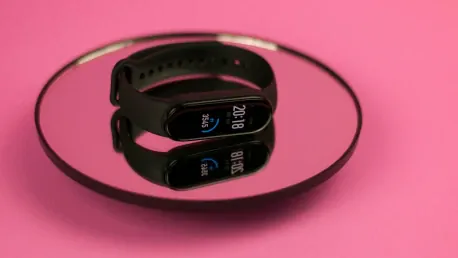Wearable technology is transforming the landscape of preventive health, offering unprecedented opportunities for continuous health monitoring, early disease detection, and personalized healthcare management. Fitness trackers, smartwatches, and advanced health sensors have enabled individuals to proactively manage their health, aligning with broader trends in digital health innovation. The potential impact of these devices can be observed daily, as they facilitate ongoing tracking of key health metrics and provide real-time feedback to users. This newfound capability not only promotes a healthier lifestyle but also significantly reduces the onset of severe health conditions.
Advancements in wearable technology have been particularly impactful during the COVID-19 pandemic. These devices provided crucial remote monitoring capabilities, cutting down the need for hospital visits and subsequently reducing exposure risks for healthcare providers. Their role extends far beyond the pandemic, offering significant advantages in tackling chronic conditions by enhancing patient engagement and enabling personalized healthcare interventions. As these devices evolve, they move beyond simple step counters to more complex tools capable of detecting and managing a variety of health parameters.
Technology and Functionality
At the core of wearable health devices are advanced sensors and algorithms that collect and process physiological data. Miniature sensors embedded in these devices, such as accelerometers, photoplethysmography (PPG) sensors, and temperature sensors, create a comprehensive picture of an individual’s health status. This data is continuously transmitted to user-friendly mobile applications, where proprietary algorithms process raw sensor data into meaningful insights.
Wearable technology provides detailed insights into heart rate variability (HRV), sleep patterns, and respiratory function, transforming how health is monitored on a daily basis. These innovations go beyond basic fitness tracking, allowing users to keep a vigilant eye on their cardiovascular health through heart rate monitoring or track sleep cycles comprehensively. Individuals can leverage these insights to make informed decisions about their health, potentially averting more severe health conditions through early intervention and continuous monitoring. This functionality epitomizes the shift toward more proactive, data-driven health management.
Benefits of Preventive Health Strategies
Wearables play a crucial role in preventive health by enabling early disease detection, supporting chronic disease management, and promoting healthy behavior changes. Devices like continuous glucose monitors (CGMs) and smartwatch-based algorithms serve as quintessential examples of modern tools assisting in managing conditions like diabetes and cardiovascular diseases. These tools allow users to receive timely alerts regarding glucose levels or signs of atrial fibrillation (AFib), which could otherwise go unnoticed until a severe episode occurs.
Wearable devices also encourage behavior modification by providing valuable feedback on physical activity, sleep quality, and other health metrics. Users can track progress in real time and make necessary adjustments to their routines. Implementing healthy changes based on this feedback helps mitigate the progression of chronic diseases and enhances overall well-being. Coupled with continuous health data tracking, wearables offer a compelling way to maintain an active lifestyle, ensure sufficient rest, and make healthier dietary choices, forming the foundation of effective preventive health.
Integration with Healthcare Systems
The seamless integration of wearable devices with telehealth services and electronic health records (EHRs) has significantly enhanced healthcare delivery. Organizations like Apple’s Health app and Ochsner Health System have pioneered innovative programs that demonstrate the transformative potential of wearable technology. By enabling real-time health data sharing and personalized care, these programs facilitate more meaningful patient-provider interactions and improve care quality.
These integrated systems empower clinicians to make informed decisions based on continuously monitored health data. Personalized health coaching, informed by wearable-generated insights, improves patient outcomes and drives higher levels of engagement in self-care. The success of these initiatives is underscored by the crucial role of clinician engagement, effective technology support, and patient-centric approaches. Ultimately, the integration of wearable technology in healthcare promises a more proactive and personalized approach to managing health.
The Industry Landscape
Leading consumer brands such as Apple, Fitbit, and Withings dominate the wearable technology market, offering user-friendly devices that monitor a range of health metrics. Apple’s significant contributions, including innovations like the ResearchKit platform, have substantially expanded the scope of wearable integration into clinical research and large-scale health studies. These technologies facilitate remote health monitoring and data collection, making them valuable tools for preventive healthcare and chronic disease management.
New entrants like iRhythm and Whoop push the boundaries with medical-grade devices that offer precise data on continuous cardiac rhythms, detailed sleep analysis, respiratory rates, and oxygen saturation levels. This growing adoption of advanced wearables indicates their potential to revolutionize patient care and support preventive health strategies. Their ongoing innovations continue to blend consumer convenience with medical-grade accuracy, shaping the future of personalized healthcare.
Addressing Data Privacy and Accuracy
The proliferation of wearable health devices raises critical concerns about data privacy, regulatory compliance, and data accuracy. Personal health information (PHI) collected by wearables is inherently sensitive, necessitating stringent privacy protections to prevent unauthorized access and misuse. Compliance with regulations such as the General Data Protection Regulation (GDPR) and the Health Insurance Portability and Accountability Act (HIPAA) is essential to maintain public trust.
Ensuring data accuracy is equally vital, as any inaccuracies could negatively impact medical decisions and user safety. Therefore, it is imperative for wearable technology to continually enhance sensor precision and address inter-operability challenges. Implementing robust data security measures, such as encryption, regular risk assessments, and role-based data access controls, becomes essential to effectively integrate these devices into healthcare systems without compromising user privacy or data reliability.
Future Developments in Wearable Technology
Future advancements in wearable technology promise even greater integration with personalized healthcare. Innovations in microfabrication and flexible electronics are creating more comfortable and versatile devices capable of non-invasive health monitoring through methods like sweat analysis. These devices are designed to seamlessly integrate with daily life while providing continuous and accurate health monitoring.
The incorporation of artificial intelligence (AI) into wearable technology significantly enhances its capabilities, enabling sophisticated data analysis and predictive analytics. AI-driven insights can predict health trends, diagnose conditions early, and deliver personalized health recommendations. The utilization of predictive analytics through AI-enabled biosensors empowers users and healthcare providers to proactively manage health, anticipate risks, and take timely interventions.
Hybrid wearable-implantable systems are on the horizon, bringing together external monitoring capabilities with internal precision. These systems promise unprecedented continuous monitoring and real-time health interventions, revolutionizing telemedicine, preventive health, and personalized patient care. This marks a significant leap towards a more efficient, data-driven, and personalized healthcare future.
Summary of Key Takeaways
Wearable technology has dramatically reshaped preventive healthcare by enabling continuous monitoring, early detection, and proactive disease management. The integration of wearable devices with telehealth and EHRs has enhanced healthcare delivery, while leading brands and new entrants continue to innovate within the market. Despite the challenges associated with data privacy, accuracy, and accessibility, wearable technology continues to blend consumer convenience with medical-grade accuracy.
As wearables advance, incorporating AI and predictive analytics offers the promise of more efficient, preventive, and personalized healthcare. These devices are poised to become an integral part of daily health management, transforming preventive health strategies and shaping the future of modern medicine.









